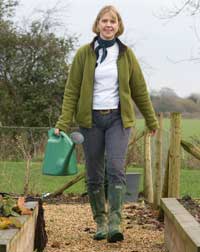Bella Hall: Life after the peas

We have grown vining peas for Birds Eye on our farm for over 40 years.
My father-in-law can recall the excitement as the first viner, bought by a co-operative of local farmers, rolled into the field.
We have 90 acres of land ready and waiting for this year’s pea crop. On our neighbour’s farm, the viners have been in the workshop all winter receiving their annual service. Except, this year they won’t be needed and neither will our 90 acres.
It seems we are all surplus to requirements in this part of the world. Suddenly redundant. This is a real indication of how fragile farming can be. One phone call and 40 years of production stops in its tracks.
Two hours from farm to factory. Fresh, local food. LEAF audited. Tenderometers to test the peas so they are picked at the optimum time. Many hoops through which to leap. It is amazing how these things cease to be important when the figures don’t add up, when different personalities take control.
We have already experienced this with our milk. One minute we had an “exclusive” local product being sold in a local supermarket chain, the next minute it was shelved because their dairy had required some investment and the figures didn’t work anymore.
Dave, the pragmatist, was not surprised when the milk contract ceased to be and seemed only mildly perturbed by the termination of the pea contract, his attitude on both occasions being more that it was good while it lasted but accept what cannot be changed and move on. Look to the next set of options and opportunities.
I had always thought that this was a negative way of approaching farming, not believing enough in the value of our product. But maybe he is just being realistic about the marketplace.
Dave’s pragmatism might also have something to do with the fact that his time spent on pigeon patrol will be halved. Nor will he have to worry about mildew, spray damage, waterlogging, aphids or any other thing that seemed to frequently blight our pea crop. No longer will our field be by-passed by the viners in an unexpected hot period when all the peas have ripened together (another fate that seemed to befall our crop quite regularly).
Having said all of this, truth be told, he would still rather be growing peas. Who knows, perhaps in the future, a solution can be found for our co-operative of pea growers who have invested so much time and effort over the past 40 years, that will see us all producing the famous pea again.
Co-operatives when they work well can be a great thing. Our village has a community shop, set up a few years ago when the store threatened to close. It is a good example of how, by working together, the village has been able to keep a service that is of real value and importance to the local community.
The shop prides itself in stocking plenty of local products including eggs, milk, organic vegetables, meat and cheeses all produced on nearby farms.
Since we lost the local pub towards the end of last year, the shop has become an increasingly important part of the community but is still struggling to remainfinancially viable.
Having employed a manager in the past, it is run and staffed entirely by volunteers who are tremendously dedicated. I recently added my name to the list of volunteers, although my assistance will be somewhat sporadic until Charlie starts school in September. My first afternoon of helping out was very interesting and I saw lots of people that I hadn’t seen for a long time and was introduced to many more.
There was an encouraging steady flow of customers, even if they were only swapping books in the book section (books can be borrowed or swapped). I managed not to completely mess the till up and enjoyed chatting to customers.
I think Dave was a bit concerned about the pile of washing at home, the mountain of ironing, the maze that I have yet to design and the 101 other things that are sitting waiting to be done. But those kind of jobs will always be there, what’s a couple of hours every now and then? A local shop that is an outlet for local products is well worth supporting.
If there was more of this going on in our country, then British farming would be much more secure and valued.
Dave was shocked to find that the Valentine roses he bought (yes, you have read that correctly, I did receive some very beautiful red roses) had been flown all the way from Colombia. It’s a good thing he doesn’t shop in supermarkets very often as it really wouldn’t do his blood pressure any good at all.
He did go shopping quite recently, however, with our herd manager, Jim.
As you might imagine this wasn’t my sort of shopping, although it was a local product. A Hereford bull called Nelson was the purchased item. He’s the brother of Lucky Sam (our bull with the big head) which I thought was quite nice.
Apparently, Jim is a little wary of Lucky Sam as he is a bit “full of beans”.
Dave calls it youthful exuberance and says that he is improving with age. Doing my best to take an interest in their shopping trip, I asked what Nelson was like, expecting a report on his temperament and pedigree. Dave’s reply was, “Well, he’s brown with a white face.” I couldn’t stop laughing but still managed to clout him with a handy cushion.
Bella Hall lives on a farm at Metfield on the Norfolk/Suffolkborder with husband Dave and their three children, William, Evieand Charlie.
The family farm covers 1500 acres and has 200-plus milkingcows.
Bella designs and runs The Southwold Maize Maze during thesummer.


